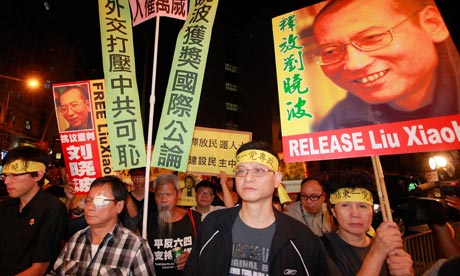
Bài đang biên tập...:)
---
Communist party elders are defying China's censors by pressing ahead with a bold demand for freedom of expression, after authorities erased their attack on the "invisible black hand" of central propaganda officials.
Twenty-three former senior officials known for their reformist views, including Mao Zedong's secretary Li Rui and a former editor of the People's Daily, Hu Jiwei, signed the open letter.
Analysts expressed scepticism about the prospects for change in the near future, and stressed that the signatories no longer had power, but said their action might help people within the leadership to push for reforms.
Members of the group said they would publish the letter formally tomorrow, with hundreds more signatures, after censors scrubbed the call from websites.
"The truth can't be blocked; now the letter has spread," said Xin Ziling, one of its authors and a former official at the China National Defence University.
"We will release a formal version tomorrow and you will see the names of all the 500 people who signed."
Xiao Mo, another signatory and formerly a senior architecture official, added: "They can keep deleting, but we will keep posting. We will not be silenced so easily."
He added: "Currently the central propaganda department is the most conservative and stupid force. If one day the Chinese Communist party really goes down, I think the propaganda department should take quite a lot of credit."
The letter accuses officials of ignoring China's constitution, which guarantees the rights of free speech and a free press. "This false democracy of formal avowal and concrete denial has become a scandalous mark on the history of world democracy," it says.
Several of the signatories have been prevented from publishing books themselves.
The document began appearing on websites yesterday, days after the government denounced the decision to give the Nobel peace prize to the dissident Liu Xiaobo, who was jailed after co-writing a document calling for democratic reforms, and before a major political meeting which begins on Friday. It also follows repeated, highly unusual remarks by the Chinese premier, Wen Jiabao, about political reform, most recently in a CNN interview.
"Even the premier of our country does not have freedom of speech or of the press," the authors complained, pointing out that Chinese media had omitted Wen's advocacy of political reform from reports of his comments.
An industry source said authorities summoned the editor-in-chief of the Beijing News after it referred to the remarks, even though it did not quote Wen's most sensitive comments. Staff at the paper said they did not know about such a summons.
Signatories said the letter was prompted by the censorship of Wen and the recent detention of Xie Chaoping, a writer who reported corruption, although he has since been released.
They distanced themselves from Liu, although some analysts suggested that was to prevent their appeal being written off.
"Day to day these people have zero power. But in symbolic terms this is certainly unwelcome to Beijing," said Nicholas Bequelin, Asia researcher at Human Rights Watch, noting the respect awarded to elders in China.
"It adds to the evidence that there is some disquiet within the party regarding the hardline tone and reaction that we have seen."
He said there was concern at the inexorable rise in power of the security apparatus.
But he cautioned that the disagreement "is not between conservatives and reformers, but between hardliners and more pragmatic leaders".
Many in China think freedom of expression would be the most plausible starting point for wider but incremental political reform.
Xin said that could be a breakthrough. "It doesn't cost much, it doesn't need investment, it won't cost 4 trillion yuan," he said, referring to the cost of China's stimulus package last year.
"There are people [in the leadership] who object to the idea of reforms, and their power is not small, but they are not big enough to control the whole society and such a big country.
"There is a historical inertia, quite severe within the Chinese Communist party, which means many people do not dare to express their opinion. That doesn't mean they don't agree."
Xiao said conditions had improved since Mao's time. "If you said something that was 'wrong' during the cultural revolution, you'd be killed … Now there is space, although limited."
But he added that censorship had become stricter recently. "They often use 'maintaining stability' as an excuse. True, stability is the foundation of a country, but you cannot maintain stability by suppressing the people … You have to actually solve the problems."
Several signatories contacted by the Guardian declined to be interviewed. Others could not be reached.
Chỉ mỗi Zunie xem bài này tính tại thời điểm này...
Trả lờiXóaOa oa bùn khiếp
Trả lờiXóaThêm Khoằm nưã.
Trả lờiXóaXe xem rồi, nhưng không online khi xem, nên multi không để lại dấu vết. Xe vẫn thường đánh máy kichbu.multiply . com, rồi sau đó đọc. Siêng năng thì signin và còm, còn lười thì ... hê hê hê ...
Trả lờiXóa"
Trả lờiXóaHe added: "Currently the central propaganda department is the most conservative and stupid force. If one day the Chinese Communist party really goes down, I think the propaganda department should take quite a lot of credit."
"
Mít ướt
Trả lờiXóaLâu lâu mới ghé comment, comment xong chủ blog tự ái chết luôn.
Trả lờiXóa